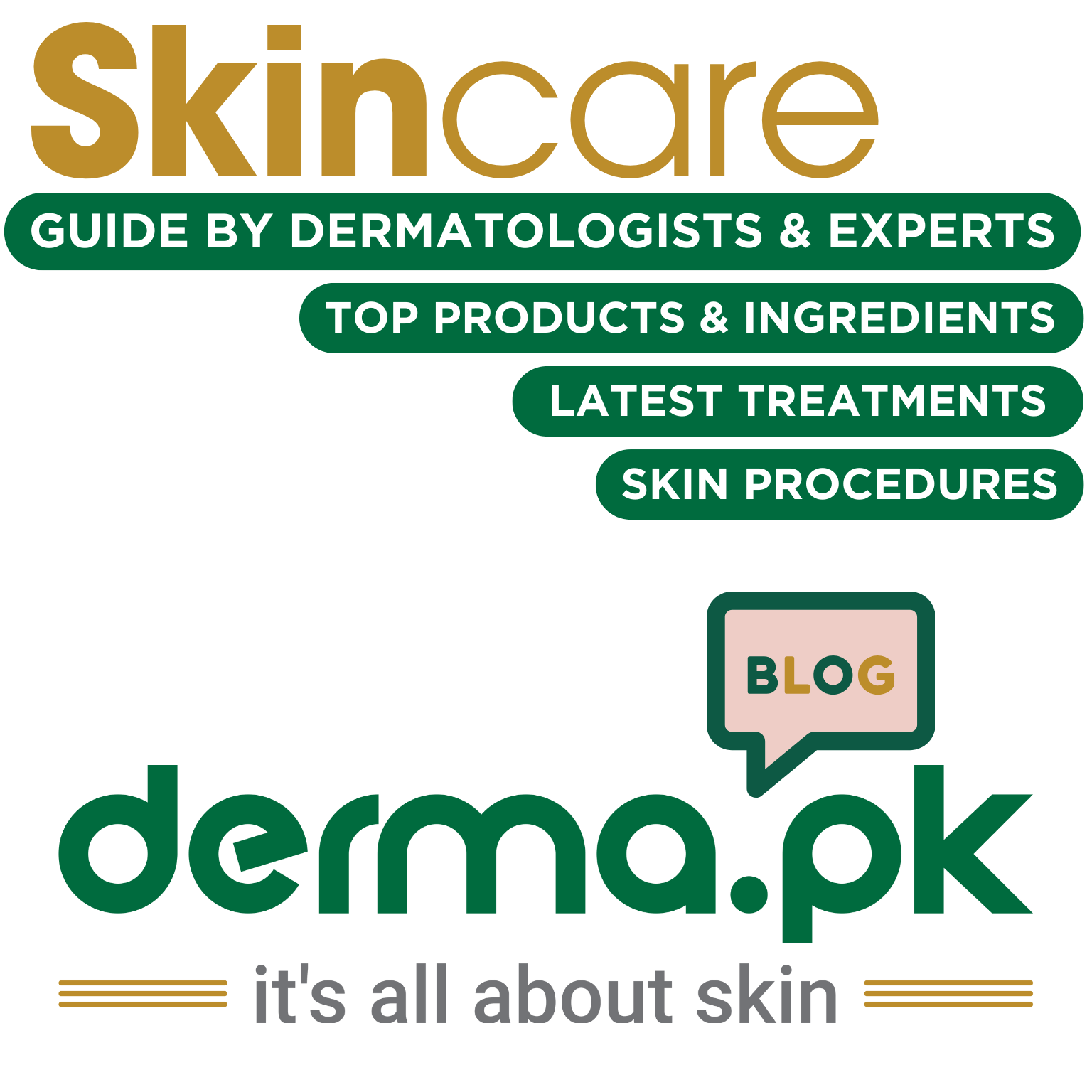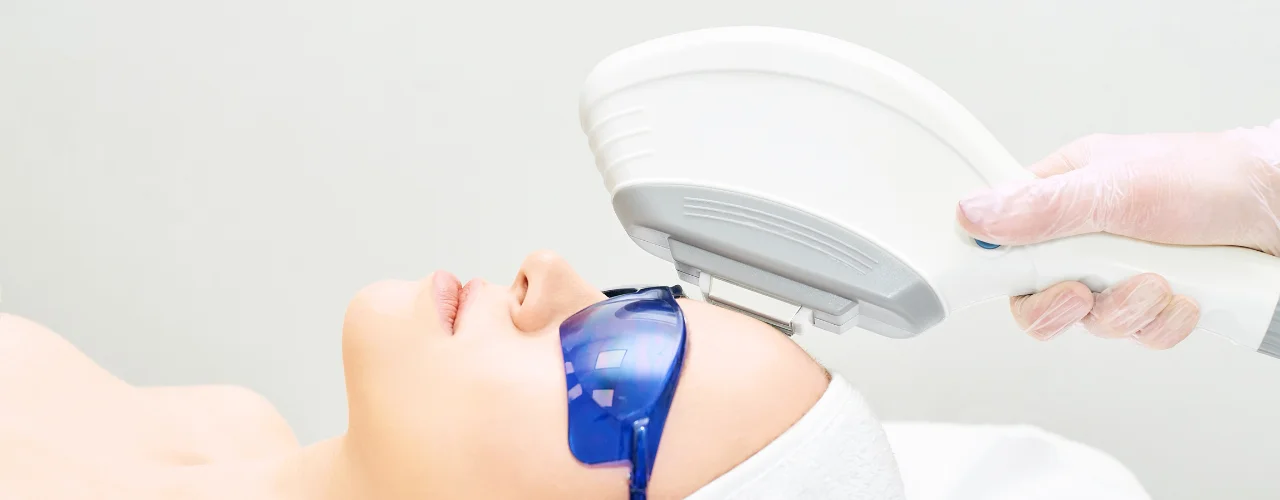Intense pulsed light (IPL) is a type of light therapy used to treat various skin conditions and concerns especialy IPL for Skin Care and Hair Removal. It works by delivering short, intense bursts of light to the skin, which are absorbed by specific targets underneath the surface.
Potential benefits of IPL:
- Hair removal: IPL is a popular option for hair removal on the face, legs, arms, and other areas. The light energy targets the melanin in the hair follicles, damaging them and preventing hair growth.
- Pigmented lesion removal: IPL can be used to treat various pigmented lesions, such as sun spots,age spots, and freckles. The light energy targets the melanin in the lesions, causing them to fade or disappear.
- Vascular lesion treatment: IPL can be used to treat vascular lesions such as spider veins and rosacea. The light energy targets the hemoglobin in the blood vessels, causing them to shrink or disappear.
- Skin rejuvenation: IPL can be used to improve the overall appearance of the skin by reducing fine lines, wrinkles, and pore size. The light energy stimulates the production of collagen and elastin, which are essential for maintaining skin firmness and elasticity.
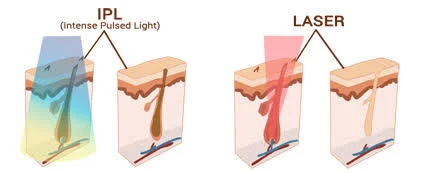
Things to consider before IPL treatment:
- Skin type: IPL is most effective for people with light skin and dark hair. People with darker skin tones may be at risk of hyperpigmentation or scarring.
- Medical conditions: Certain medical conditions, such as epilepsy, pregnancy, and active infections, can make IPL treatment unsafe.
- Medications: Some medications can increase the risk of side effects from IPL treatment.
Potential side effects of IPL:
- Redness and swelling: These are common side effects that usually resolve within a few hours.
- Blistering or crusting: These are less common side effects that may require treatment.
- Hyperpigmentation or hypopigmentation: These are rare side effects that can be permanent.
It is important to consult with a qualified dermatologist or other healthcare professional to determine if IPL is right for you and to discuss the potential risks and benefits.
Scientific Studies on IPL Technology
There have been numerous scientific studies conducted on the effectiveness and safety of IPL technology. Here are some examples:
Hair Removal:
- A 2019 study published in the Journal of Cosmetic Dermatology found that IPL hair removal was safe and effective for long-term hair reduction in women with Fitzpatrick skin types I-IV. The study followed participants for 12 months after treatment and found significant reductions in hair density and
thickness. - A 2018 study published in the Lasers in Surgery and Medicine journal compared IPL to other hair removal methods, such as laser hair removal and electrolysis.
The study found that IPL was effective for long-term hair reduction, with results comparable to other methods Pigmented


Lesion Removal:
- A 2020 study published in the Journal of the American Academy of Dermatology found that
IPL was effective for treating sunspots and freckles in Asian patients. The study found that IPL was safe and well-tolerated, with minimal side effects. - A 2017 study published in the Journal of Cosmetic and Laser Therapy compared IPL to other treatments for melasma, a common skin condition that causes brown patches on the face. The study found that IPL was as effective as other treatments, such as hydroquinone, with fewer side effects.
Vascular Lesion Treatment:
- A 2023 study published in the Journal of Cosmetic Dermatology found that IPL was effective for treating facial spider veins in women with Fitzpatrick skin types I-III. The study found that IPL was safe and well-tolerated, with
minimal side effects. - A 2022 study published in the Lasers in Surgery and Medicine journal compared IPL to other treatments for rosacea, a skin condition that causes redness and flushing. The study found that IPL was effective for reducing redness and improving overall skin appearance.
Skin Rejuvenation:
- A 2021 study published in the Journal of Dermatological Treatment found that IPL was effective for improving the appearance of fine lines and wrinkles in women with Fitzpatrick skin types I-III. The study found that IPL was safe and well-tolerated, with minimal side effects.
- A 2020 study published in the Journal of Cosmetic and Laser Therapy compared IPL to other treatments for acne scarring. The study found that IPL was effective for improving the appearance of acne scars, with results comparable to other treatments.
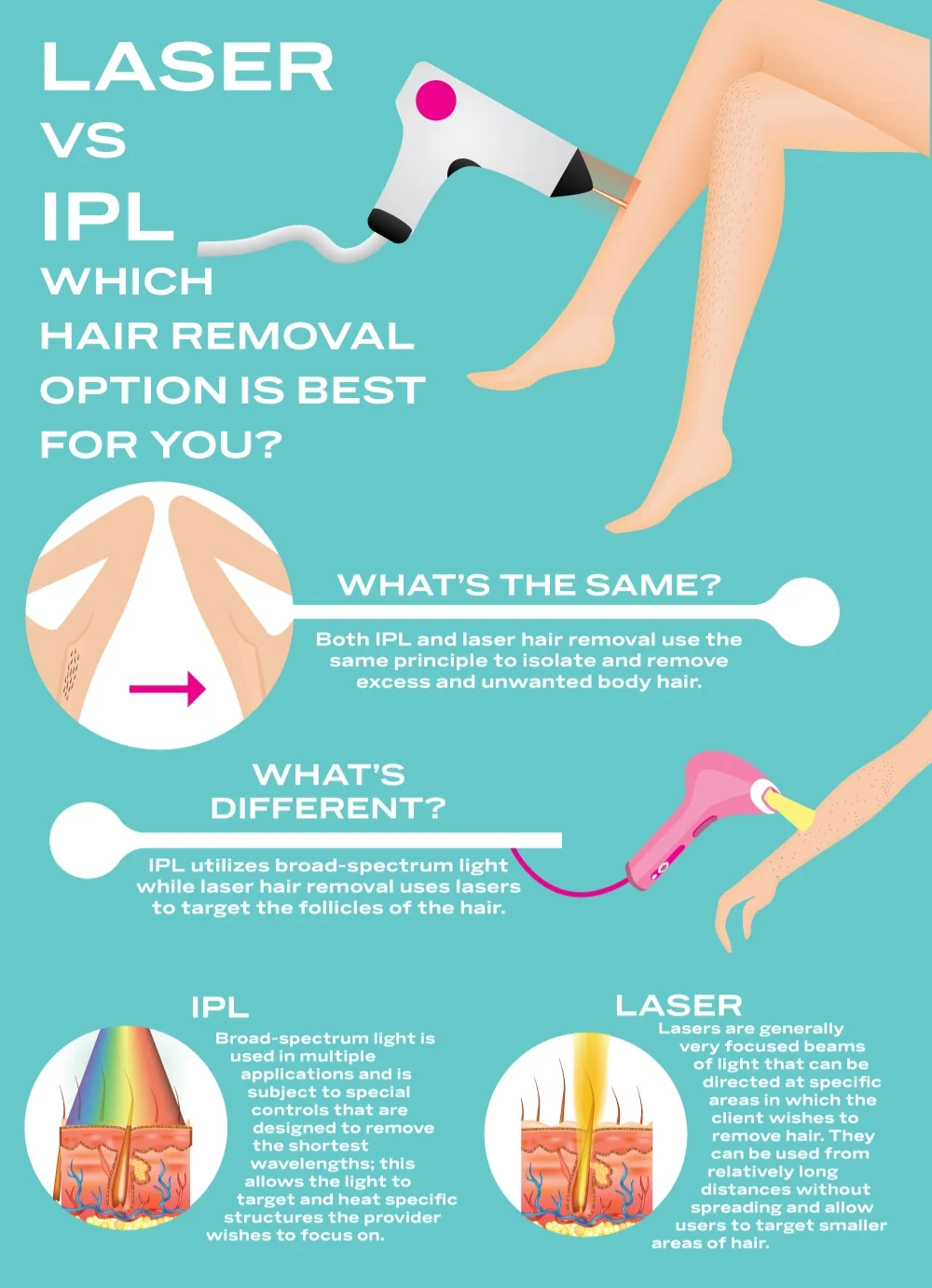
These are just a few examples of the many scientific studies that have been conducted on IPL technology. The overall evidence suggests that IPL is a safe and effective treatment for a variety of skin conditions.It is important to note that every person is different, and individual results may vary. It is always important to consult with a qualified dermatologist or other healthcare professional to discuss the potential risks and benefits of IPL treatment and to determine if it is right for you.
Understanding why you might need IPL
IPL can address various skin concerns, but it’s important to understand if it’s the right approach for your specific needs. Here are some potential reasons
why someone might consider IPL treatment:
Hair Removal:
- Unwanted hair: IPL can be an effective solution for long-term hair reduction on various body areas, including the face, legs, arms, and bikini line. It works by targeting melanin in the hair follicles, slowing down hair growth. This can be beneficial for individuals who find shaving, waxing, or other hair removal methods inconvenient or ineffective.
- Ingrown hairs: IPL can also help prevent ingrown hairs, which are a common issue for people who shave or wax regularly. The light energy targets the hair follicle, preventing it from growing back into the skin.
Pigmented Lesion Removal:
- Sun damage: IPL can help reduce the appearance of sun damage, such as sun spots, age spots, and freckles. These are caused by an accumulation of melanin in the skin due to sun exposure. IPL targets this melanin, causing the spots to fade or disappear.
- Melasma: This skin condition causes brown patches, primarily on the face, and can be triggered by hormonal changes or sun exposure. IPL can help reduce the appearance of these patches by targeting the melanin-producing cells.
Vascular Lesion Treatment:
- Spider veins: These are small, visible veins that often appear on the legs and face. IPL can be used to treat spider veins by targeting the hemoglobin in the blood vessel, causing it to shrink or disappear.
- Rosacea: This skin condition causes redness, flushing, and small bumps on the face. IPL can help reduce the appearance of these symptoms by targeting the blood vessels in the skin.
Skin Rejuvenation:
- Fine lines and wrinkles: IPL can be used to improve the appearance of fine lines and wrinkles by stimulating collagen production. Collagen is a protein that gives the skin its elasticity and firmness.
- Acne scars: IPL can help improve the appearance of acne scars by reducing their size and depth. This is achieved by stimulating collagen production and promoting tissue remodeling. It’s important to note that IPL is not a one-size-fits-all solution. The effectiveness of the treatment will depend on various factors, including your skin type, hair color, and the severity of your condition.
Consulting a qualified dermatologist or healthcare professional is crucial. They can assess your individual needs and determine if IPL is the right treatment for you. They can also discuss the potential risks and benefits, ensuring you have all the information you need to make an informed decision.
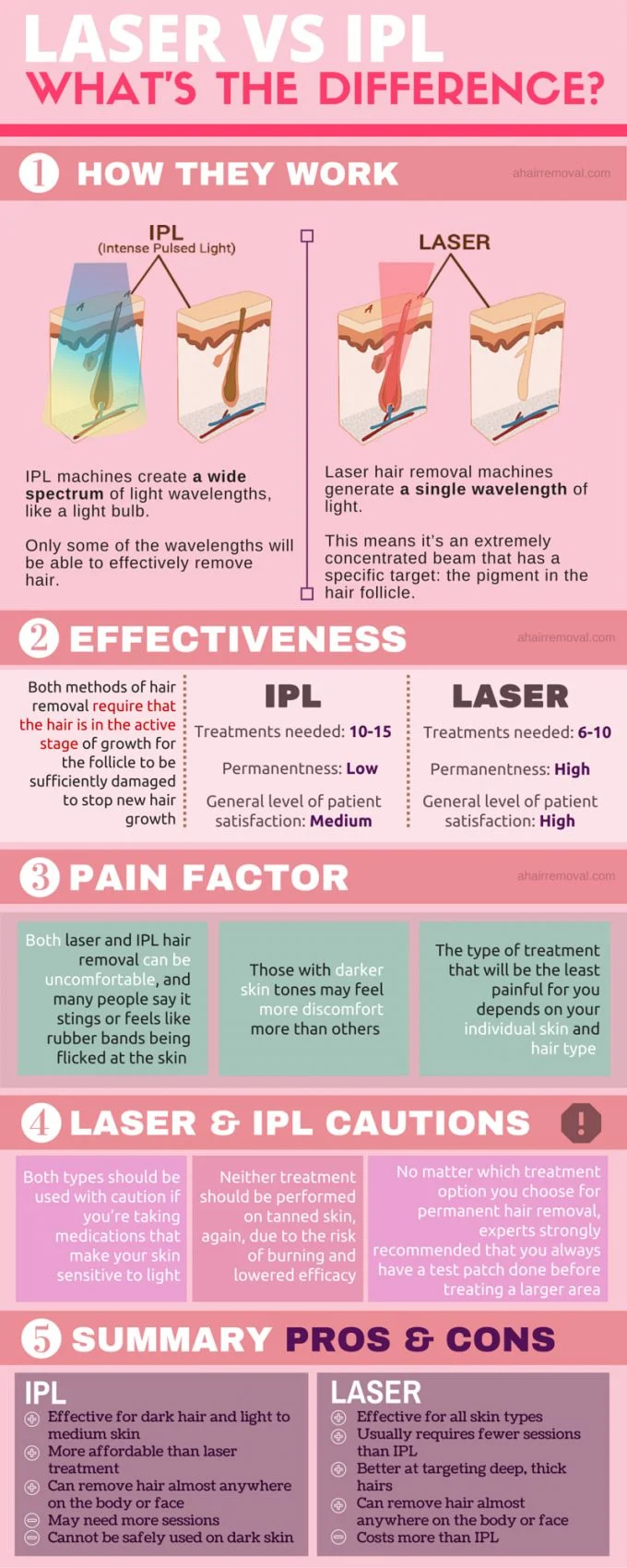
IPL: Pros and Cons
Pros:
- Effective for long-term hair reduction: IPL can significantly reduce hair growth on various body areas.
- Non-invasive: IPL does not require surgery or injections, making it a comfortable and convenient option.
- Minimal downtime: Most people can resume their normal activities immediately afte treatment.
- Safe for most skin types: IPL is generally safe for people with Fitzpatrick skin types I-III. However, it’s important to consult a healthcare professional to ensure it’s suitable for you.
- Can treat various skin concerns: IPL can address various skin concerns, including hair removal, pigmented lesions, vascular lesions, and fine lines and wrinkles.
- Relatively fast treatment sessions: IPL treatments typically take 15-30 minutes, depending on the treatment area.
- No need for anesthesia: IPL is generally well-tolerated and does not require anesthesia.
Cons:
- Not permanent: IPL results are not permanent, and touch-up treatments may be needed every few months to maintain results.
- May not be effective for light-colored hair: IPL works best on dark hair with melanin to absorb the light energy.
- Can be expensive: The cost of IPL treatment can vary depending on the treatment area, number of sessions needed, and experience level of the provider.
- Risk of side effects: While generally safe, IPL can cause some side effects, such as redness, swelling, and temporary changes in skin pigmentation.
- Not suitable for everyone: IPL is not suitable for people with darker skin tones, pregnant or breastfeeding women, and people with certain medical conditions.
- Requires multiple sessions: To achieve optimal results, multiple IPL sessions are usually necessary.
- Can be uncomfortable: Some people may experience discomfort during IPL treatment, especially in
sensitive areas. It’s important to weigh the pros and cons of IPL treatment before making a decision.Who might benefit from IPL treatment?
IPL treatment can be a good option for people who have:
Unwanted hair: IPL iseffective for long-term hair reduction on various body areas, including the face,legs, arms, and bikini line. It can be a convenient alternative to shaving, waxing, or other hair removal methods. - Sun damage: IPL can help reduce the appearance of sun spots, age spots, and freckles, which are caused by an accumulation of melanin in the skin due to sun exposure.
- Vascular lesions: IPL can be used to treat spider veins and rosacea, which are common skin conditions that cause visible blood vessels and redness on the face.
- Fine lines and wrinkles: IPL can stimulate collagen production, which can help improve the appearance of fine lines and wrinkles.
- Acne scars: IPL can help reduce the appearance of acne scars by stimulating collagen production and promoting tissue remodeling.
Here are some specific examples of people who might benefit from IPL treatment:
- People with fair skin and dark hair: IPL is most effective for people with this combination because the light energy is better absorbed by the melanin in the hair follicles.
- People who are looking for a long-term hair removal solution: IPL can significantly reduce hair growth, and many people find it to be a more convenient and effective option than shaving or waxing.
- People who are concerned about sun damage: IPL can help to reverse the visible signs of sun damage, such as sun spots and age spots.
- People with rosacea: IPL can be an effective treatment for rosacea, which can cause redness, flushing, and visible blood vessels on the face.
- People who are looking for a non-invasive treatment for wrinkles: IPL can help to improve the appearance of fine lines and wrinkles without surgery or injections.It is important to note that IPL is not a one-size-fits-all solution. The effectiveness of the treatment will depend on your individual needs, and you should consult with a dermatologist or other healthcare professional before undergoing treatment. They can assess your skin type, hair color, and the severity of your condition to determine if IPL is the right treatment for you.
Intense Pulsed Light
(IPL) Treatment Performed by Dermatologists
IPL (Intense Pulsed Light) is a versatile technology used in dermatology to address various skin concerns. It utilizes a broad spectrum of light energy to target specific tissues in the skin, offering effective and non invasive solutions for individuals seeking improvement in their appearance.
Why choose a dermatologist for IPL treatment?
Dermatologists are medical professionals specializing in skin health and diseases. They possess extensive knowledge about the skin’s structure and function, making them highly qualified to perform IPL treatments safely and effectively.
Here are some compelling reasons to choose a dermatologist for your IPL treatment:
- Expertise: Dermatologists have undergone years of specialized training and possess in-depth knowledge about IPL technology, its applications, and potential side effects.
- Individualized care: They meticulously assess your skin type, condition severity, and desired results to personalize your treatment plan, ensuring optimal outcomes.
- Safety and efficacy: Dermatologists understand the appropriate settings for IPL equipment and employ techniques that maximize effectiveness while minimizing risks.
- Comprehensive care: They can address any underlying skin concerns that may contribute to your condition and provide guidance on post-treatment care to optimize results.
What skin concerns can dermatologists treat with IPL?
Dermatologists use IPL to address various aesthetic and medical conditions, including:
- Hair removal: IPL effectively targets melanin in hair follicles, leading to long-term hair reduction on various body areas.
- Pigmented lesions: IPL can reduce the appearance of sunspots, age spots, and freckles by targeting melanin deposits in the skin.
- Vascular lesions: Spider veins and rosacea, characterized by visible blood vessels, can be treated with IPL to improve skin tone and appearance.
- Acne scars: IPL can stimulate collagen production and promote tissue remodeling, leading to a
reduction in acne scar visibility. - Fine lines and wrinkles: By stimulating collagen production, IPL can help reduce the appearance of fine lines and wrinkles, resulting in smoother and firmer skin.
If you’re considering IPL treatment, remember:
- Consultation with a qualified dermatologist is crucial.
- Discuss your expectations and desired results to establish a personalized treatment plan.
- Adhere to pre- and post-treatment instructions provided by your dermatologist for optimal results and safety.Choosing a dermatologist for your IPL treatment ensures safe, effective, and personalized care, enhancing your skin’s health and appearance.
Pre-Care Tips for IPL Treatment
To ensure optimal results and minimize potential side effects, follow these
pre-care instructions before your IPL treatment:
General:
- Avoid sun exposure: For 2-4 weeks before your treatment, avoid tanning beds, sunbathing, and self-tanning products. Sun exposure can increase the risk of hyperpigmentation and burning during the treatment.
- Discontinue certain medications and supplements: Consult your dermatologist about any medications or supplements you are taking, as some may increase sensitivity to light or interfere with the treatment.
- Shave the treatment area: Shave the area to be treated 1-2 days before your appointment. This will ensure better light penetration and reduce discomfort.
- Hydrate your skin: Drink plenty of water and moisturize your skin regularly in the days leading up to your treatment. Well-hydrated skin tolerates IPL better.
- Avoid irritants: Avoid using harsh soaps, scrubs, or exfoliants on the treatment area for at least a week before your appointment.
Additional tips for specific concerns:
- Hair removal: Avoid waxing, sugaring, or depilatory creams for at least 4 weeks before the treatment. These methods remove the hair root, which is necessary for IPL to work effectively.
- Pigmented lesions: Avoid picking or scratching at any moles, warts, or other pigmented lesions in the treatment area.
- Vascular lesions: Avoid hot baths, saunas, and strenuous exercise for 24 hours before your treatment. These activities can increase blood flow to the area, making it more sensitive to the light.
Remember:
- Inform your dermatologist about any medical conditions, allergies, or recent procedures you have undergone.
- Bring a list of all medications and supplements you are currently taking.
- Arrive for your appointment with clean, dry skin free of makeup and lotions.
Following these pre-care instructions will help prepare your skin for IPL treatment and ensure a safe and successful experience.
Post-Care Tips for IPL Treatment
Following your IPL treatment, it’s important to take proper care of your skin to optimize
results and minimize the risk of side effects. Here are some post-care instructions to follow:
General:
- Apply ice packs: Ice packs can help reduce swelling and redness in the treated area. Apply them
for 10-15 minutes at a time, several times a day. - Use a gentle moisturizer: Apply a fragrance-free, gentle moisturizer to the treated area several times a day. This will help keep your skin hydrated and soothe any irritation.
- Avoid sun exposure: For at least 2 weeks after your treatment, avoid direct sunlight and wear sunscreen with SPF 30 or higher whenever you go outside. Sun exposure can increase the risk of hyperpigmentation and other side effects.
- Avoid hot showers and baths: Avoid hot showers, baths, saunas, and hot tubs for 24-48 hours after your treatment. These can irritate the skin and increase redness.
- Avoid strenuous activity: Avoid strenuous exercise for 24-48 hours after your treatment. This can also irritate the skin and increase blood flow to the area.
- Do not pick or scratch: Avoid picking or scratching at the treated area. This could lead to scarring or infection.
- Avoid makeup and skincare products: Avoid applying makeup and harsh skincare products to the treated area for 24 hours. These can irritate the skin and interfere with the healing process.
Additional tips for specific concerns:
- Hair removal: Avoid plucking, waxing, or using depilatory creams on the treated area for at least 4 weeks after your treatment. This allows the hair follicles to fully recover.
- Pigmented lesions: Avoid using any bleaching creams or lightening products on the treated area for at least 2 weeks after your treatment.
- Vascular lesions: Avoid hot compresses and massaging the treated area for 24-48 hours after
your treatment.
Remember:
- Follow your dermatologist’s specific instructions carefully.
- Contact your dermatologist if you experience any concerning side effects, such as severe pain, blistering, or prolonged redness.
- Be patient! It may take several weeks to see the full results of your treatment.
Related Medicines and Products for IPL Treatment
Following an IPL treatment, it’s important to use specific products and medications to promote healing and minimize potential side effects. Here’s a breakdown of some commonly recommended items:
Medications:
- Pain relievers: Over-the-counter pain relievers like ibuprofen or acetaminophen can help manage any discomfort or swelling after treatment. Consult your doctor before taking any medication, especially if you have any underlying health conditions.
- Antibiotics: In some cases, your doctor might prescribe antibiotics to prevent infection, especially if you experience any breaks in the skin after treatment.
- Topical corticosteroids: Your doctor may recommend a mild topical corticosteroid cream to reduce inflammation and redness in the treated area.
Skincare Products:
- Gentle cleanser: Choose a fragrance-free, gentle cleanser to wash the treated area twice daily. Avoid harsh soaps and scrubs, as they can irritate the skin.
- Moisturizer: Apply a fragrance-free, non-comedogenic moisturizer to the treated area several times a day. This will help keep your skin hydrated and soothe any irritation.
- Sunscreen: Always apply sunscreen with SPF 30 or higher to the treated area, even on cloudy days. Sun exposure can increase the risk of hyperpigmentation, burns, and other side effects.
- Aloe vera gel: Aloe vera gel has soothing properties and can provide relief from redness and irritation. Apply a thin layer to the treated area several times a day.
Additional Products:
- Cold compresses: Apply ice packs wrapped in a clean towel to the treated area for 10-15 minutes several times a day. This can help reduce swelling and discomfort.
- Vitamin C serum: Vitamin C can help lighten hyperpigmentation and boost collagen production. Apply a topical Vitamin C serum to the treated area after the skin has fully healed.
Important notes:
- Consult your dermatologist before using any new medications or skincare products after IPL treatment.
- Avoid using products that contain alcohol, fragrances, or harsh chemicals, as these can irritate the skin.
- Do not use any bleaching creams or lightening products on the treated area for at least 2 weeks.
- Do not pick or scratch at the treated area, as this could lead to scarring or infection.
Remember to follow your dermatologist’s specific instructions and use products as directed. By taking proper care of your skin after IPL treatment, you can promote optimal healing and minimize the risk of side effects.
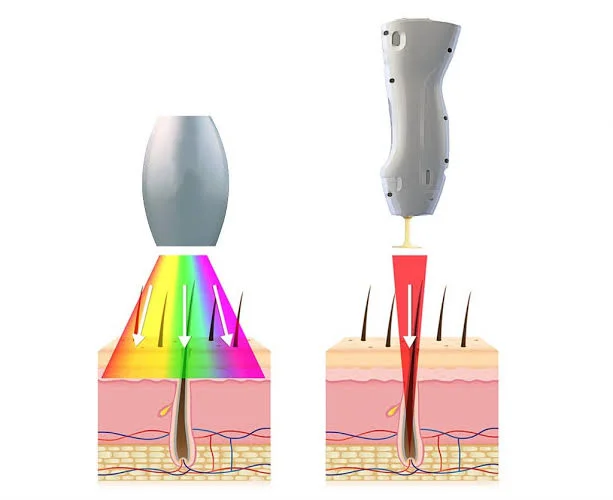
Conclusion and Final Thoughts
IPL technology offers a non-invasive and versatile treatment for various skin
concerns. Its ability to address hair removal, pigmented lesions, vascular
lesions, and signs of aging makes it a popular choice for individuals seeking
to enhance their appearance. However,before undergoing IPL treatment, it’s crucial to understand the potential benefits and risks. Consulting a qualified dermatologist ensures proper assessment, personalized treatment plan, and safe application of the technology.
Here are some key takeaways:
- IPL is effective for long-term hair reduction and improving the appearance of pigmented lesions, vascular lesions, and fine lines and wrinkles.
- It is a non-invasive and relatively comfortable treatment with minimal downtime.
- The effectiveness of IPL treatment depends on various factors, including your skin type, hair color, and the severity of your condition.
- It is essential to follow pre- and post-care instructions for optimal results and minimized risks.
- Consulting a qualified dermatologist is crucial for safe and effective IPL treatment.
Ultimately,the decision to undergo IPL treatment should be based on your individual needs
and goals. By carefully considering the information and consulting a healthcare
professional, you can make an informed and confident choice about improving
your skin’s health and appearance.
To make an appointment at Derma & Dental Clinic, Call UAN at 0304-111-5000 or Whatsapp at 03205999650.
Visit our Facebook Page https://www.facebook.com/Dermaclinicskin/
Derma & Dental Clinic is located at: 48/38, Quaid Commercials Sector E Bahria Town, Lahore, 53720
